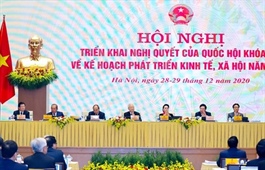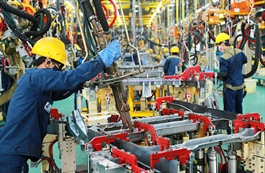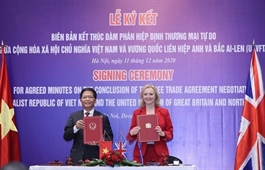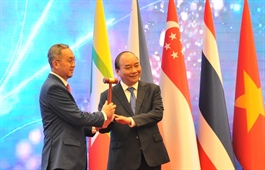USAID and the MPI in tandem to push SME development
USAID and the MPI in tandem to push SME development
The Ministry of Planning and Investment has been carrying out its task as the foremost economic advisor and key policymaker of Vietnam with potent support from the US Agency for International Development (USAID). In a talk with VIR’s Nguyen Huong, USAID Vietnam director Ann Marie Yastishock highlighted that innovation, along with science and technology, will be the backbone of the economy and a major content of the two bodies’ cooperation moving ahead.

USAID Vietnam director Ann Marie Yastishock and MPI Minister Nguyen Chi Dung launching the Program on Supporting Enterprises’ Digital Transformation for the 2021–2025 period
|
After two decades of cooperation, many programmes developed by the Ministry of Planning and Investment (MPI) in collaboration with USAID have either been achieved or are ongoing. What are the results and implications thus far?
As we look back at USAID’s assistance since 1995, it is clear that our support has been growing steadily in terms of funding levels and also in the depth and complexity of our programmes. This is a strong demonstration of the close ties and mutual respect between our two nations.
USAID has been collaborating with the MPI on a series of projects to facilitate Vietnam’s entry on the global stage as a country that engages in free, fair, and reciprocal trade. Our partnership started with the Support for Trade Acceleration projects from 2001 to 2013, followed by the Governance for Inclusive Growth (GIG) programme from 2014 to 2018, and now with the Linkages for Small and Medium Enterprises (LinkSME) project from 2018 to 2023.
In April, USAID and the MPI signed a $42 million framework agreement to improve Vietnam’s economic competitiveness. Under this deal, we will collaborate on the major areas of private sector competitiveness, along with innovation and startup ecosystem and human capital. The upcoming USAID Improving Private Sector Competitiveness project will be the first direct result of this agreement.
USAID is proud of its ongoing, fruitful partnership with the government and the MPI to boost private sector growth and accelerate Vietnam’s path to become a middle-income country. Under the USAID GIG programme, USAID helped inform the development of the Law on Support for Small- and Medium-sized Enterprises (SMEs) which was passed by the National Assembly in 2017.
We also assisted the MPI in reviewing the implementation of different versions of Resolution 19, a set of policy goals to help Vietnam reach its long-term economic growth objectives via an improved business environment and national competitiveness. Through the government’s strong political will, active engagement with the public and private sectors, and ongoing support from USAID and other donors, Vietnam’s competitiveness ranking improved from 82nd to 68th in the World Bank’s Doing Business 2018 Report.
USAID is also collaborating with the MPI to strengthen the capacity of public and private business support organisations to establish business links between Vietnamese SMEs and national and international lead corporations. Stronger organisations will increase the sustainability of government efforts for SMEs to integrate into regional and global supply chains.
How would you assess the capability of Vietnamese SMEs in joining regional and global supply chains, and how can they benefit from the support programmes?
SMEs account for 98 per cent of Vietnam’s businesses and contribute 45 per cent of GDP and 63 per cent of employment. However, few Vietnamese SMEs can participate in regional and global supply chains.
Although Vietnamese SMEs have strong growth potential, they face many challenges such as limited production capacity, technology utilisation, and human resources (both skilled labour and management). SMEs are also hampered by a lack of experience in relationship building with lead businesses, limited understanding of global supply chains’ requirements, and inadequate access to finance.
Through the LinkSME project, USAID is collaborating with the MPI along with public and private business support organisations to establish business. Vietnamese SMEs can register online to participate in the project and to seek assistance from business associations, trade groups, promotion agencies, and export development centres.
Currently, the project is supporting the integration of Vietnamese SMEs into global supply chains in sectors of electronics, metals, textiles and garments, leather and footwear, food processing and agribusiness, wood processing, and furniture, among others.
By joining USAID’s LinkSME, SMEs can access comprehensive capacity building programmes on sales and marketing, total productive maintenance, the application of key performance indicators, and compliance with ISO certification requirements. They can also connect with national and international lead corporations through business matchmaking events such as the Manufacturing Matchmaking Event 2020 and Sourcing Fair for Supporting Industries 2020.
Earlier this month, USAID LinkSME, in collaboration with the Center for Supporting Industries Development, organised the Forum on Linkage and Investment Opportunities for Small- and Medium-sized Enterprises in Ho Chi Minh City. The event was a platform for 126 SMEs in supporting industries to connect and build business links with leading corporates and to explore investment opportunities with stakeholders such as industrial zones, high-tech parks, and commercial banks.
SMEs are considered the key driving force of the economy. How would you assess the role and efforts of the MPI in supporting and boosting their development?
The MPI, under Minister Nguyen Chi Dung’s leadership, has been a proactive and committed partner to USAID. It has been a champion of USAID’s assistance to improve Vietnam’s business environment, enhance national competitiveness, and boost private sector development.
Together, we support the ministry’s development of a strategy and action plan for 2021-2025 to help SMEs participate in Vietnam’s digital transformation. The strategy and action plan will enhance SMEs’ competitiveness and strengthen their resilience in the post-pandemic context.
On December 3, I was pleased to co-chair a launching ceremony with Minister Dung to announce the Program on Supporting Enterprises’ Digital Transformation 2021-2025 in Hanoi. USAID is proud to be part of this visionary effort to digitally transform Vietnam’s SMEs, enhance competitiveness, and strengthen their resilience in the post-coronavirus context.
The pandemic has changed a lot of business behaviours and lifestyles in general. How will the prominent cooperation between USAID and the MPI be affected?
Over the next few years, the USAID LinkSME project and the MPI will implement a digital transformation pilot programme so that by 2025, 100 per cent of enterprises are aware of digital transformation; at least 100,000 enterprises are supported to use a digital transformation readiness evaluation tool and other digital solutions; and at least 100 manufacturing and processing enterprises successfully adopt digital transformation.
Examples of the successful application of digital transformation will be replicated on a larger scale. A network of at least 100 digital transformation experts and agencies will also be established to assist in providing digital consultancy and services for enterprises.
USAID will also collaborate to enhance SMEs’ access to finance through knowledge sharing, and through technical assistance to help SMEs prepare and submit their applications to gain access to finance from banks.
Under the upcoming USAID Improving Private Sector Competitiveness project, we will expand the scope of assistance to support small and growing businesses, including those owned by women, to increase their access to current technology, technical knowledge, fundamental business skills, and capital.



























